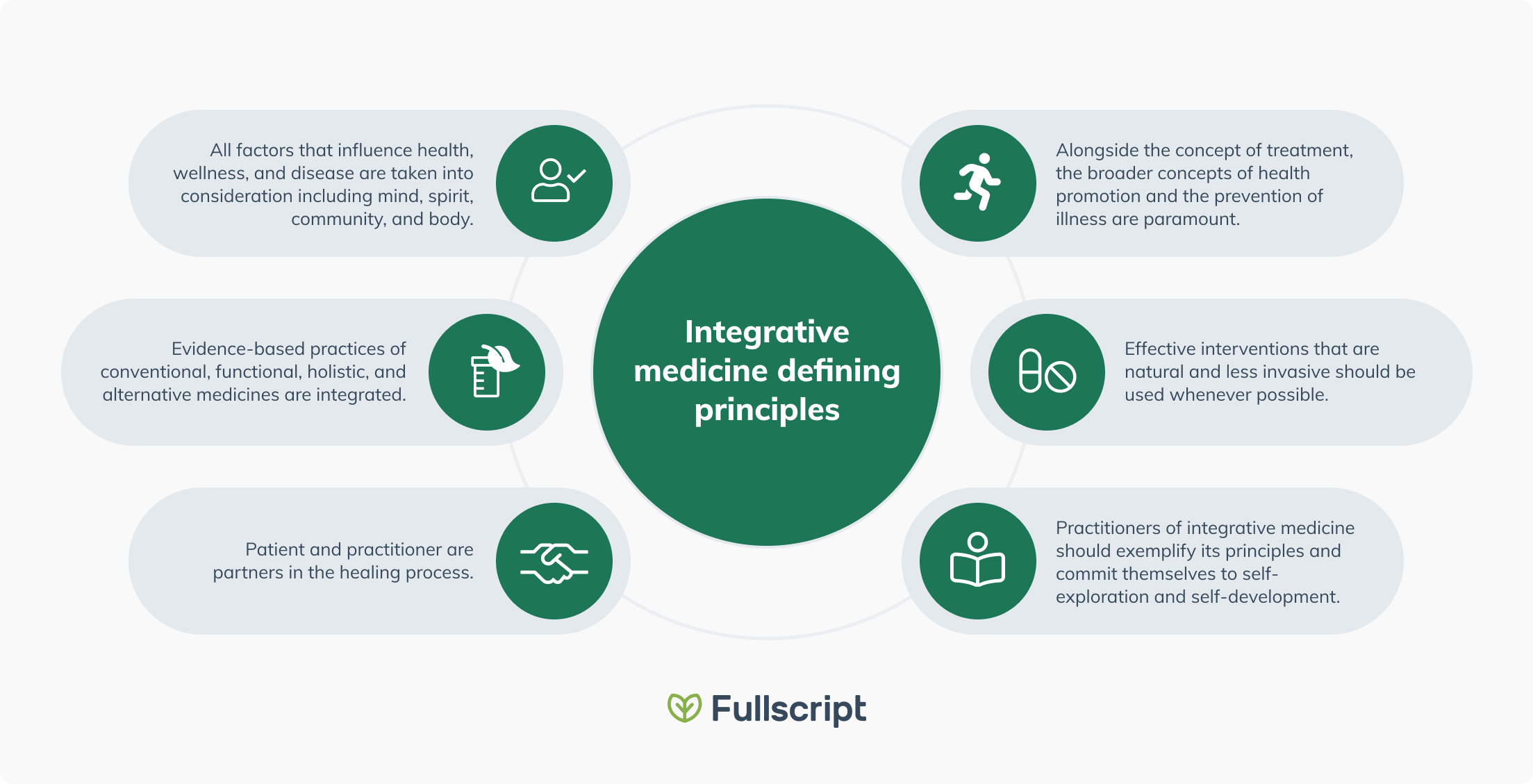By Karolyn Gazella, content writer; and Dr. Alex Keller, ND, medical director at Fullscript |
One of the key tenets of integrative medicine is that good medicine is based on good science, which is inquiry-driven and open to new paradigms. Integrative medicine is good medicine and so much more.
In this article, you’ll learn what integrative medicine is, the benefits of it, and more.
What is integrative medicine?
Integrative medicine can be described and defined in different ways. But for the most comprehensive description, it helps to refer to the “Father of Integrative Medicine,” Dr. Andrew Weil.
The Andrew Weil Center for Integrative Medicine describes integrative medicine as “healing-oriented medicine” that considers the whole person within the context of a collaborative therapeutic relationship between practitioner and patient. It is informed by scientific evidence, uses all appropriate integrative therapies, and is guided by the defining principles outlined in the graphic below.

In addition to treating the physical body, integrative medicine treats patients via emotional, environmental, mental, and spiritual means by integrating mind and body with a holistic approach.
Other keywords often used to define integrative medicine include “empowering,” “evidence-based,” “individualized,” “interprofessional,” and “patient-centered.” According to a 2009 paper on the topic of integrative medicine and patient-centered care, the authors explain that patient-centered care is a core component of integrative medicine and has a movement all its own, which is rooted in customized treatments and decision-making based on the patient’s beliefs and preferences.
Many people wonder how integrative medicine relates to conventional or Western medicine. Integrative medicine is an approach to health and wellness that combines:
- Conventional (traditional Western) medicine: a medical system in which medical professionals treat symptoms and diseases using drugs and/or surgical procedures
- Complementary medicine: a type of medicine that combines non-mainstream approaches (e.g., acupuncture, dietary supplements, medicinal herbs) in combination with conventional medicine
What types of providers deliver integrative medicine?
Many licensed healthcare practitioners provide integrative care to their patients. Examples of practitioners and doctors who may practice integrative care include:
- Acupuncturists
- Ayurvedic practitioners
- Chiropractors
- Conventional medical doctors
- Dietitians and nutritionists
- Doctors of oriental medicine
- Homeopathic doctors
- Massage therapists
- Naturopathic doctors
- Nurses
- Nurse practitioners
- Osteopathic doctors
Who is integrative medicine for?
Individuals of all ages and those with varying health conditions may benefit from integrative medicine. Integrative medicine can help promote overall health and well-being and aid in chronic disease management and prevention.
What types of complementary and alternative therapies are available?
Dietary supplements are the most commonly used integrative modality; however, other popular approaches include therapeutic breathing techniques, diet therapy, and yoga. Integrative medicine further incorporates a variety of integrative therapies including acupuncture, Ayurveda, chiropractic, homeopathic, naturopathic, and traditional Chinese medicine alongside conventional medicine.
Examples of complementary therapies include:
- Nutritional: Therapeutic diets, supplements, medicinal herbs, and microbial-based therapies (e.g., probiotics)
- Psychological: Meditation and other relaxation therapies
- Physical: Acupuncture, massage, and spinal manipulation
- Combinations of nutritional, psychological, and physical therapies: Yoga, tai chi, art therapy, mindful eating
Comparing conventional medicine, integrative medicine, complementary, and alternative medicine
How does integrative medicine differ from alternative, complementary, and conventional medicine?
- Alternative medicine is when a non-conventional treatment is used in place of conventional medicine.
- Complementary medicine refers to treatments used as adjuncts to conventional treatments and is not a synonym for integrative medicine because integrative medicine is broader and utilizes evidence-based techniques to encourage health and healing rather than focusing on disease and treatment.
- Conventional medicine is steeped in technologies focused on diagnosis, complex treatments, and interventions that may overlook more simple tools such as diet and lifestyle.
When a provider or medical facility utilizes both complementary and conventional medical care, it is considered integrative medicine.
The history of integrative medicine
There are significant events that have taken place over the past 50 years that have helped form integrative medicine as we know it is today.

Today it’s estimated that more than one third of Americans use some form of complementary or integrative health approach. Within cancer care that percentage skyrockets, with some estimates as high as 95% and most surveys at around 50%. Among people with chronic illness, surveys indicate that 70 to 90% use an integrative approach.
What are the benefits of integrative medicine?
Based on a 2020 systematic review, the number one reason people use integrative medicine worldwide is because of the expected benefits, and the second reason is that they are dissatisfied with conventional medicine.
Obviously, for something to be sustainably popular, the user needs to get some benefit. Based on a 2018 review, the scientifically validated benefits of integrative medicine are many and varied, including:
- Enhanced treatment outcomes
- Improved emotional and mental well-being
- Increased patient satisfaction
- Improved symptoms, especially in the area of oncology with improvement reported for appetite, cognition, fatigue, pain, and sleep
Integrative medicine also excels when it comes to addressing gastrointestinal disorders, musculoskeletal conditions, cardiovascular disease, and stroke.
Integrative medicine in clinical trials
Perhaps the most well-known randomized controlled clinical trials showing that an integrative approach using diet and lifestyle could reverse cardiovascular disease was conducted by Dean Ornish et al in 1998. Acupuncture, another key integrative treatment modality, has been backed by a significant amount of scientific research. According to a 2019 review, clinical evidence suggests that acupuncture may help treat 96 different health problems including cancer-related symptoms, a variety of different types of pain, and mental health issues such as anxiety and depression.
What are the risks of integrative medicine?
As with all types of medicine, there are some risks to consider when receiving integrative medicine therapies. It’s important to note that some therapies may have side effects or cause adverse effects or injuries, and not all natural therapies are inherently safe. When considering or seeking integrative health care, it’s important to:
- Choose a licensed practitioner who practices evidence-based medicine.
- Discuss any changes or additions to your care plan with your primary care practitioner.
- Share all medications and supplements with your integrative healthcare provider.
- Share recent medical procedures, treatments, or other relevant information regarding your health with your new provider.
- Take medications and other supplements as directed by your integrative medicine practitioner.
The future of integrative medicine
“My hope for the future is that integrative medicine will be taught to all health professionals and payment incentives will be revised to support its practice,” said Victoria Maizes, MD, the Executive Director of the Andrew Weil Center for Integrative Medicine.
“…integrative medicine is here to stay and nations who ignore its precious resources would do so at their own economic and health costs,” concluded the authors of a 2021 paper on the future of medicine. The authors conclude that integrative medicine must be integrated into medical research, education, and policy. While it’s true that integrative medicine is here to stay, some would argue that it’s always been here and we just needed to rediscover it.
In the coming years, there will likely continue to be an increase in usage and an increase in the number of integrative medicine programs offered throughout North America. This is good news for both integrative medicine practitioners and their patients.
*This article originally appeared on Fullscript.com.
About The Authors
Karolyn Gazella
Karolyn A. Gazella is the founder of the Natural Medicine Journal and the host of the Natural Medicine Journal Podcast. She also co-hosts the Five to Thrive Live weekly radio show on the Cancer Support Network, which is also widely available as a podcast. She has been writing and publishing integrative health information since 1992 and is the author or co-author of several books and booklets on a variety of holistic health topics.
Dr. Alex Keller, ND
Dr. Alex Keller is a practicing naturopathic doctor in Ottawa, Canada and the Medical Director at Fullscript. As Medical Director, he oversees the Integrative Medical Advisory team (IMAT) and the development of educational content for practitioners across North America. Dr. Keller completed a degree in naturopathic medicine at the Canadian College of Naturopathic Medicine.












